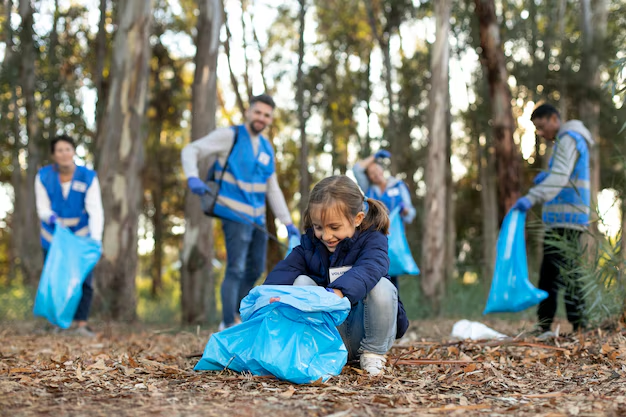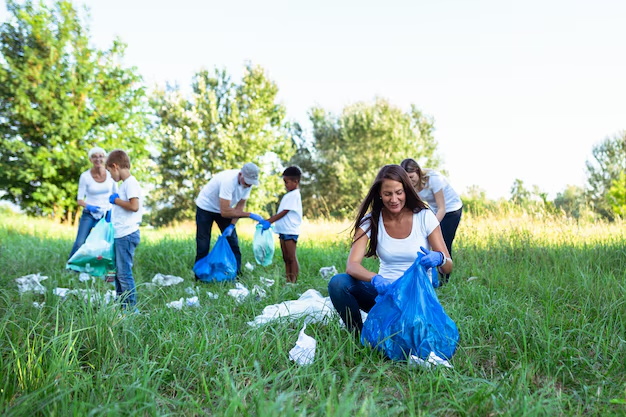Table of Contents
Introduction
Plastic pollution has become a global crisis, with millions of tons of plastic waste polluting our oceans, landfills, and ecosystems. For many, the solution lies in embracing a zero-waste lifestyle, a conscious effort to reduce waste and eliminate reliance on single-use plastics. While the idea of “zero waste” might sound daunting, it’s a journey made up of small, practical steps that anyone can take to reduce their impact on the environment.
This guide will walk you through the essentials of zero-waste living, focusing on how to ditch plastics for good while adopting sustainable habits that benefit both the planet and your well-being.

What is Zero-Waste Living?
Zero-waste living is a lifestyle that seeks to minimize waste production, with a particular focus on reducing disposable and non-recyclable materials like plastics. The goal is to create a circular system where resources are reused, repurposed, or recycled instead of being discarded.
Core Principles of Zero Waste:
- Refuse: Say no to items you don’t need, especially single-use plastics.
- Reduce: Simplify your consumption by buying only what’s necessary.
- Reuse: Opt for reusable alternatives to disposable products.
- Recycle: Properly sort and recycle materials that can’t be reused.
- Rot: Compost organic waste to return nutrients to the soil.
Why Ditch Plastics?
1. Plastic Pollution Is Everywhere
Plastics are incredibly durable, taking hundreds of years to break down. This longevity means that almost all the plastic ever produced still exists in some form, polluting landfills, oceans, and natural habitats.
- Fact: Over 8 million tons of plastic enter the ocean every year.
- Impact: Plastic waste harms marine life, disrupts ecosystems, and contaminates food chains.

2. Health Risks of Plastic
Plastics contain harmful chemicals like BPA and phthalates, which can leach into food, water, and the environment. These chemicals have been linked to hormonal disruptions, developmental issues, and certain cancers.
3. Environmental Impact
The production of plastic requires fossil fuels, contributing to carbon emissions and climate change. Transitioning away from plastics reduces both waste and energy consumption.
Practical Steps to Ditch Plastics for Good
1. Start with the Basics: Refuse Single-Use Plastics
The easiest way to cut down on plastic waste is to refuse single-use plastics like bags, straws, bottles, and utensils.
- Tips:
- Carry a reusable shopping bag wherever you go.
- Say no to plastic straws and use stainless steel or silicone alternatives.
- Invest in a high-quality reusable water bottle to replace disposable ones.

2. Switch to Reusable Options
Swap disposable plastic items for durable, reusable alternatives:
- Replace:
- Plastic Wrap → Beeswax wraps or silicone food covers.
- Plastic Containers → Glass or stainless steel containers.
- Disposable Coffee Cups → A reusable travel mug.
- Plastic Grocery Bags → Canvas or mesh tote bags.
- Pro Tip: Keep a “zero-waste kit” with essentials like reusable utensils, a water bottle, and a shopping bag.

3. Rethink Food Storage and Shopping
Food packaging is one of the largest contributors to plastic waste, but there are simple ways to shop and store food more sustainably.
- Grocery Shopping Tips:
- Shop at bulk stores where you can bring your own containers for grains, spices, and other items.
- Buy fresh produce and skip the pre-packaged options.
- Support farmers’ markets, which often have less plastic packaging.
- Food Storage Tips:
- Use glass jars or stainless steel containers for storing leftovers.
- Freeze food in silicone bags instead of plastic freezer bags.
- Choose compostable parchment paper over plastic wrap.

4. Embrace Plastic-Free Personal Care
Many personal care products, like shampoos and toothbrushes, come packaged in plastic. Switch to zero-waste alternatives:
- Options:
- Use shampoo and conditioner bars instead of bottled products.
- Swap plastic toothbrushes for bamboo ones.
- Choose toothpaste tablets or powders packaged in glass jars.
- Look for deodorants, lotions, and soaps in compostable or refillable packaging.

5. Avoid Plastic in Cleaning Supplies
Cleaning products often come in plastic bottles and contain harmful chemicals.
- Eco-Friendly Alternatives:
- Make your own cleaning solutions with vinegar, baking soda, and essential oils.
- Use reusable cleaning cloths instead of disposable wipes.
- Purchase refillable or concentrated cleaning products to reduce packaging waste.
6. Compost Your Organic Waste
Composting is a fantastic way to reduce waste while creating nutrient-rich soil for plants.
- What to Compost: Fruit and vegetable scraps, coffee grounds, eggshells, and yard waste.
- Plastic-Free Tip: Avoid composting items that have been wrapped in plastic or contaminated with plastic coatings.

7. Opt for Plastic-Free Packaging
When shopping for household items, choose brands that prioritize sustainable packaging.
- What to Look For:
- Paper, cardboard, or glass packaging instead of plastic.
- Products labeled as compostable or biodegradable.
- Refillable options for items like laundry detergent and cleaning sprays.

Inspiring Zero-Waste Practices Around the World
1. Bulk Food Stores
Zero-waste grocery stores like Package Free in the United States or Zero Waste Path in Europe allow customers to bring their own containers for purchases.
2. Bans on Single-Use Plastics
Countries like Kenya and Rwanda have implemented strict bans on plastic bags, setting a global example of effective plastic reduction policies.
3. Community-Led Cleanup Drives
Grassroots initiatives, such as beach cleanups or recycling programs, inspire communities to work together to reduce waste and raise awareness.

Challenges of Ditching Plastics
While transitioning to a plastic-free lifestyle is rewarding, it can come with challenges:
1. Accessibility
- Not everyone has access to zero-waste stores or affordable alternatives.
- Solutions: Start small by focusing on what’s available locally, like reusing glass jars or avoiding single-use plastics.
2. Convenience
- Single-use plastics are often more convenient than reusables.
- Solutions: Build habits gradually, and always keep reusable items handy.
3. Initial Costs
- Some zero-waste products have a higher upfront cost.
- Solutions: Remember that these items are reusable and save money over time.

Benefits of Zero-Waste Living
1. Environmental Impact
Ditching plastics reduces pollution, conserves natural resources, and protects wildlife.
2. Financial Savings
Reusable products, like water bottles and cloth bags, eliminate the need to constantly buy disposable items.
3. Improved Health
Avoiding plastic helps minimize exposure to harmful chemicals, leading to a healthier lifestyle.
4. Personal Satisfaction
Living sustainably fosters a sense of accomplishment and responsibility for the planet.

Getting Started: Your First Steps to Zero Waste
- Conduct a “plastic audit” to identify where most of your plastic waste comes from.
- Choose one area to focus on, such as grocery shopping or personal care.
- Gradually replace disposable plastics with durable, reusable alternatives.
- Join a zero-waste community or follow online resources for inspiration and support.

Conclusion
Transitioning to a zero-waste lifestyle is one of the most impactful ways to combat plastic pollution and create a healthier planet. By making small, intentional changes—such as refusing single-use plastics, embracing reusable options, and shopping more sustainably—you can significantly reduce your plastic footprint.
Ditching plastics for good isn’t just an environmental choice; it’s a commitment to a better future for yourself, your community, and generations to come. Start your journey today—because every small step counts toward a big impact.
FAQs
1. What is zero-waste living?
Zero-waste living is a lifestyle focused on reducing waste, reusing resources, and minimizing reliance on single-use plastics.
2. How can I start reducing plastic waste?
Begin by refusing single-use plastics like bags and bottles, switching to reusable items, and choosing plastic-free alternatives for food storage and personal care.
3. Are zero-waste products expensive?
While some items have a higher upfront cost, they are reusable and save money over time compared to disposable products.
4. Can I live a completely plastic-free life?
Eliminating plastic entirely can be challenging, but reducing its use significantly is achievable and impactful.
5. Why is ditching plastics important?
Plastics harm the environment, wildlife, and human health. Reducing plastic use helps combat pollution and creates a sustainable future.
